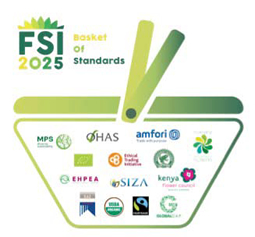 Starting 1 January 2021, the FSI Basket of standards has a third scope. The GAP and Social scopes are complemented with an Environmental scope. With IPM and reliable record keeping at the centre, this new scope will offer growers and their supply chain partners capacity to keep the sector future-proof.
Starting 1 January 2021, the FSI Basket of standards has a third scope. The GAP and Social scopes are complemented with an Environmental scope. With IPM and reliable record keeping at the centre, this new scope will offer growers and their supply chain partners capacity to keep the sector future-proof.
It has become evident that reliable record keeping is essential to measure and demonstrate sustainable progress and positive impacts. As new tools like environmental impact indicators and footprints become more widely used, such as the one being developed by FSI, there is urgency to put record keeping in the scope of the FSI Basket. This will offer producers more opportunities to keep their toolbox full, and to proactively demonstrate and discuss with NGO’s, legislators and customers, while remaining the owner of their data.
FSI has been actively promoting this development towards certification schemes, who were invited to adopt or modify their record keeping criteria in line with the FSI benchmarking requirements and encouraged to tailor their services to their client base in the best way possible.
Several standards have been successfully benchmarked and compliant with the FSI Environmental benchmark criteria. Kenya Flower Council Silver Standard, Florverde® Sustainable Flowers Standard and MPSABC/ GAP/SQ are the first standards to be included to the Environmental scope of the FSI Basket. Other floriculture schemes are currently being reviewed for benchmarking and we expect some of them to be recognised and communicated as compliant soon.
FSI members of trade and retail are actively asking for products that comply with the FSI Basket given that they are starting to report on all 3 scopes of the FSI basket of Standards. As such, certified growers are directly rewarded by being actively bought, promoted and recognised as responsible sources on the auction clocks and in various web-shops.
Measuring 2020 This year, FSI members of Trade and Retail are reporting for the 6th time on their volumes of responsible flowers and plants, using their 2020 data against the FSI Basket of standards.
This year, FSI members of Trade and Retail are reporting for the 6th time on their volumes of responsible flowers and plants, using their 2020 data against the FSI Basket of standards.
Members of production are sharing their certification status with the FSI Secretariat and are included in the reporting as well. Based on some preliminary results we see again an increase in the percentage sustainably produced and traded flowers and plants!
FSI members are regularly meeting to evaluate progress and discuss issues they are facing, as well as solutions to continue stimulate responsible production and sourcing. As of next year, as part of the FSI2025 ambition, they will start a more stringent reporting process including the Environmental scope (see above) and with individual action plans and accountability towards the 90% target.
